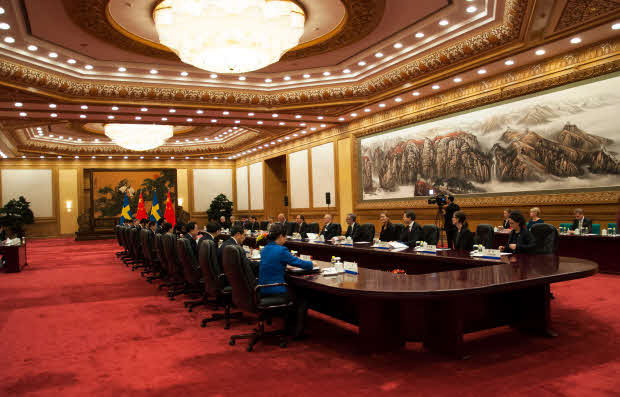[wzslider]
On 27-28 March, 2015, Sweden’s newly elected Prime Minister Stefan Lofven went on his first trip to China.
On 28 March China’s President Xi Jinping and Prime Minister Stefan Lofven of Sweden met at the Boao State Guest House in Hainan Province.
Xi Jinping extended welcome to Stefan Lofven for attending the Boao Forum for Asia Annual Conference 2015 and launching the series of events commemorating the 65th anniversary of the establishment of diplomatic relationship between China and Sweden. Xi Jinping pointed out that this China visit was the Swedish Prime Minister’s visit is your first trip to Asia since he assumed office, which reflects the importance and friendly affections he and Sweden attach to and hold towards China.
Xi Jinping also recognized that Sweden is the first Western country that established diplomatic relationship with the People’s Republic of China.
“Since China and Sweden established diplomatic relationship 65 years ago, bilateral relations have grown from tiny to big and from weak to strong and achieved remarkable results,” remarked the President.
Xi Jinping emphasized that in the next step, the two sides should further strengthen political guidance, respect each other’s core interests and major concerns, increase top-level design of and political input into bilateral relations, maintain the momentum of high-level exchanges and expand common consensus.
Furthermore, the two countries should boost cooperative partnership in such fields as sustainable growth, industrial optimization and upgrading, innovation-driven and green economy on the basis of existing cooperation in information and telecommunication, upper-end manufacturing, energy efficiency, environmental protection, new energy and other fields.
“Both sides should also strengthen people-to-people and cultural exchanges and set up platforms for exchanges between the youth,” said the President and expressed the hope that the Swedish side will provide convenience on visa issuing for Chinese citizens who visit Sweden for vacation or business.
Also, the two nations should step up communication and coordination on the post-2015 UN development agenda, climate change, global health security and other international affairs.
“Sweden, which actively engages in international affairs and places importance on China’s significant role, is ready to strengthen communication and coordination with China within the framework of the United Nations,” Sweden’s Prime Minister replied in return.
He also expressed the wish to carry out cooperation with China on clean and efficient transport, research, innovation and green growth.
“Sweden-China economic and trade exchanges are developing smoothly as China’s investment in Sweden increases.”

Stefan Lofven extended gratitude to Xi Jinping for inviting him to attend the Boao Forum for Asia (BFA) Annual Conference 2015 and noted that the speech delivered by President Xi Jinping at the opening ceremony of the forum charts the course for the future cooperation in Asia and is of great significance for Sweden and Europe.
“The Asian Infrastructure Investment Bank (AIIB) initiative that President Xi Jinping put forward is very important. Sweden is highly interested in the AIIB initiative and wishes to carry out cooperation with China on it.”
In his speech at BFA the Swedish PM highlighted the Globalisation and the rapid growth in Asia that has brought enormous benefits – reduced poverty and rising living standards.
‘Globalisation brings countries together. It promotes strengthened political, economic and commercial contacts, and also people-to-people exchanges.”
He brought up the global tasks ahead, with the upcoming UN Summit on a new post-2015 sustainable development agenda, and the Paris Conference on Climate Change, making three points in connection to that.
It must be a joint effort, the PM said, pointing to the need for creativity and commitment of civil society, of a responsible and sustainable business sector, and – most importantly – of citizens. He has assigned his post-2015 team to consult with civil society and the business community in this regard on how they can contribute. Resources are also key, including official development assistance, where Sweden will continue using 1 per cent of its GNI to ODA.
He also highlighted the need for gender equality.
“Significant economic gains can be made when women are able to develop their full labour market potential. Raising the female labour force rate to male levels would, for instance, raise GDP in the United States by 5 per cent, in Japan by 9 per cent, in Sweden 10 per cent, and in Egypt by 34 per cent.”
And these issues interlinks with the need for halting climate change, expressing his confidence in that the world can make an agreement, come December, in Paris, that will result in an ambitious commitment to our common goal: to keep the global temperature increase below two degrees.
“There is great potential, everywhere, to cut emissions whilst improving economic performance – with positive effects for health, poverty reduction and energy security.”
“Many countries have taken important steps to curb emissions. Like China has already done, all countries ought to present national contributions to the climate conference in Paris. Sweden has a target of reducing emissions by 40 per cent by 2020.”
Our experience is that very clear climate objectives help mobilise stakeholders such as businesses and cities,” the Swedish PM continued, pointing to economic instruments as a successful way to reduce emissions as well as environmental impact, improve health, and promote innovation and green investments – resulting in green jobs.
Slideshow photos: /swedeninchina.com
